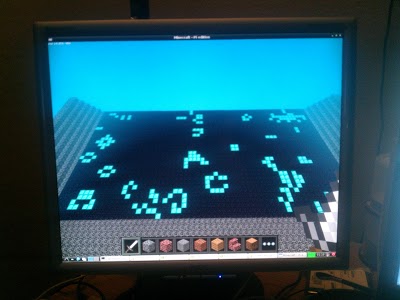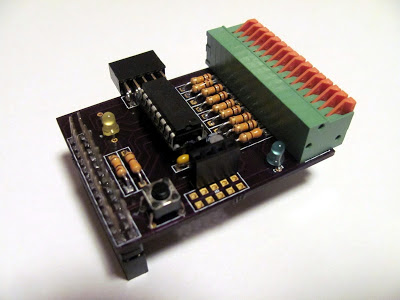Jason Mildrum has blogged about a better version of Conway’s Game of Life for Minecraft. Read more about it and get the code
New expansion boards – Custard Pi 1 & 2 – for the #RaspberryPi
Two new expansion boards today – Custard Pi models 1 & 2.
Custard Pi 1 is a relatively straightforward GPIO breakout board with lots of over-voltage protection on the pins. Screw terminals are provided for all the usable pins. It is available for £9.50 from eBay.
Custard Pi 2 also breaks out GPIO but adds some bits. Here is a list of all the features: 2 analog inputs, 2 analog outputs, 4 digital outputs, 4 digital inputs plus over-voltage protection. Again, screw terminals are provided. It is available for £19.50 from eBay.
These seem to be neat little boards, especially for those Pi owners who are worried about connecting something up which might damage the Pi. I wonder if they might cause a bit of a reckless attitude towards circuit design – plug it in and assume that the over-voltage protection will save you from mistakes, but I guess that’s the point – very child friendly. Version 1 is marketed as a ‘protection layer’ and Version 2 is marketed as a more general-purpose I/O board.
Here’s a picture of Custard Pi 1:

And one of Custard Pi 2:

More information is available from SF Innovations, the creator of the products.
Overall, they seem like good, well-made products and the screw-terminals are very practical. The price for the second one seems a bit high, but on the other hand you do get those handy analog ports, which would probably be your main reason for choosing it. Documentation is available in the form of User Guides via their website and seems to be in good order with Python code examples.
ACCU conference has several #RaspberryPi sessions / @Raspberry_Pi
The ACCU, which is an organisation of professional programmers, are holding their annual conference in Bristol at the Marriott Hotel from the 9th to the 13th April. There are several Raspberry Pi sessions and here is a list of them:
- 9th – Hardware for Softies tutorial: Physical computing with the Raspberry Pi (Romilly Cocking / Steve Freeman)
- 10th – Inspiring future generations with open hardware – the Raspberry Pi – day 1 keynote from Eben Upton.
- 10th – The Actor Model applied to the Raspberry Pi and the Embedded Domain (Omer Kilic)
- 10th – Test driven development on the Raspberry Pi (Marc Evers / Rob Westgeest / Willem van den Ende)
More information and registration details can be found on the ACCU website. I think registration is free.
PA Consulting #RaspberryPi awards
PA Consulting Group ran a competition at the Cambridge Technology Centre on 20th March 2013 in which teams from different age groups competed against each other to win ‘best invention’ prizes. The only stipulation is that the inventions needed to use a Raspberry Pi!
Read more about the competition and the winning entries here
Three reasons why #RaspberryPi ruled PyCon 2013
Ken at The Maker’s Box has summed up the impact the Raspberry Pi made on PyCon this year:
- Eben Upton was the keynote speaker
- Everyone got a free Raspberry Pi!
- There was an open-house Pi lab which covered everything from booting up to experimenting and debugging.
Custom analog input board for the #RaspberryPi via circuits.io
Ken over at The Maker’s Box has used the website circuits.io to design a board with 8 channels of analog input with the ability to add another board on to give 16 channels! They’re not for sale – he just wanted to create something to use with his model railroad. Read more here



